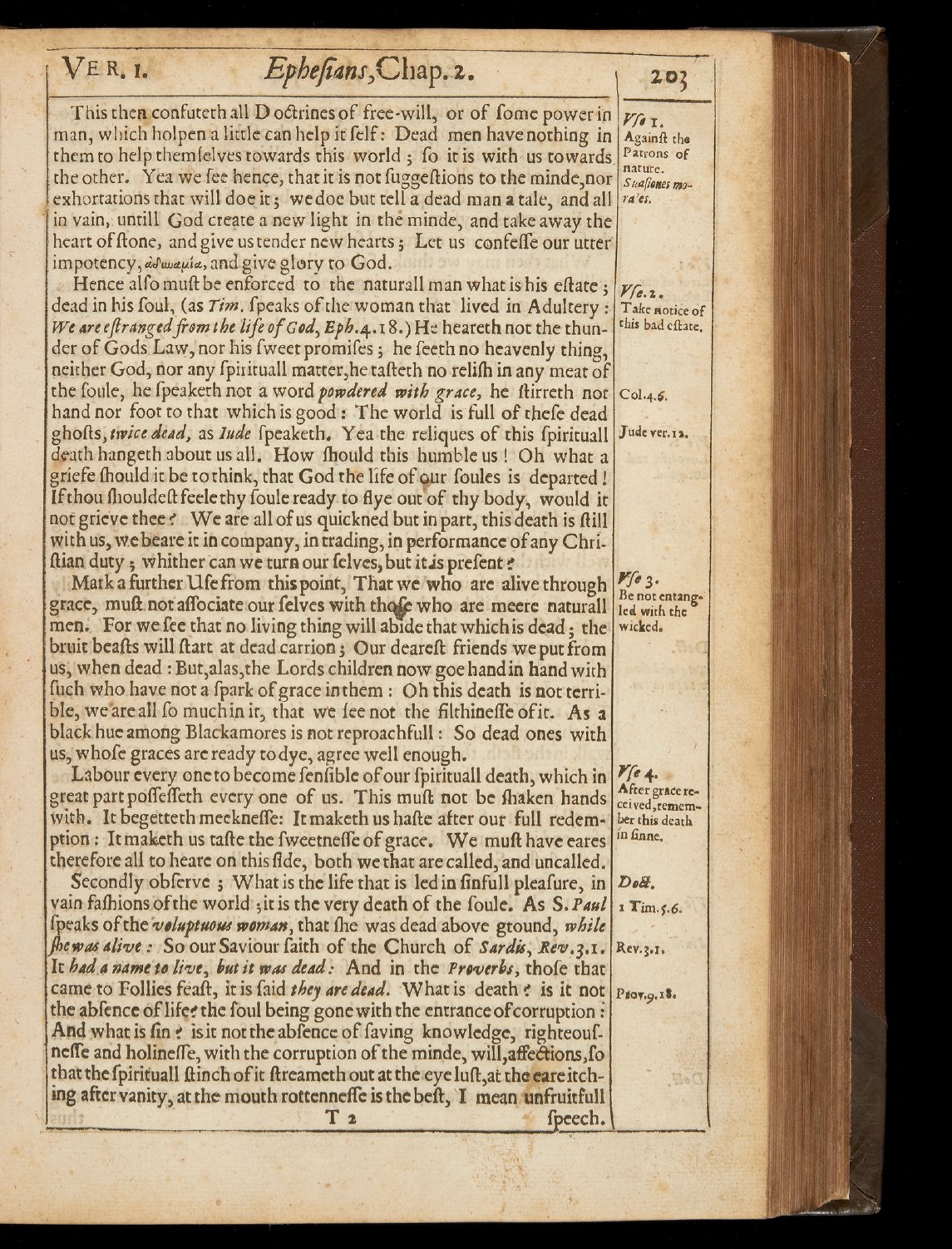

VE
R.
i.
Ephefi4nf,Cilap.
z.
203
This
then confuteth
all
D
oátrines
of
free-will,
or
of
fomc power
in
yr, I
man, which holpen
a
little
can help it
felf: Dead
men have
nothing
in
Again(
th.
them
to help them
(elves
towards
this world
;
fo it
is
with
us
towards
r"'
°R5
of
nature.
the other.
Yea we
fee
hence,
that
it
is
not
fuggeftions
to the minde,nor
SRarinerW9-
exhortations
that
will
doe
it
;
wedoe
but
tell
a dead man
a
tale,
and
all
recs.
in
vain, untill
God
create
a
new light
in
the
minde, and
take
away the
heart
of
(tone, and give
us
tender new
hearts; Let
us
confeffe
our utter
impotency,
à.Í'twauta,
and give
glary
to God.
Hence alfo
muff be
enforced
to the
natural! man what
is
his
eftate
;
ye.2.
dead
in
his foul, (as
Tim. (peaks
of
the
woman that
lived
in
Adultery
:
rakenotieeof
We
areeflranged
from
the life
of
God,
Eph.4.1 8.) He
heareth not the thun-
`t,
badeft,te
der
of
Gods Law, nor
his
fweet promifes
;
he feeth no heavenly thing,
neither
God,
nor
any fpirituall
matter,he tafteth
no reli(h
in any meat
of
the
foule,
he fpeakethnot
a
word
powdered
with grace,
he ftirreth
not
coi.4,6.
hand nor foot
ro
that which
is
good
:
The
world
is
full
of
thefe dead
ghofts,
twice
dead,
as
lade fpeaketh.
Yea
the
reliques
of
this fpirituall
Jndeer.io.
death hangeth about
us
all. How fhould this humble
us
!
Oh
what
a
griefe
(hould it
be
to
think, that God the
life
of
our
foules
is
departed
!
If
thou fhouldeftfeelethy
foule ready
to
flye
out
of
thy body,
would it
not grieve thee
a
We
are
all
of
us
quickned but
in
part, this death
is
(lill
with us,
webeare
it
in
company,
in
trading,
in
performance
of
any
CM.
than duty
;
whither
can we turn our felves,
but
itis
prefent
Mark
a
further
Ufefrom
this point,
That
we who are
alive
through
Be
not
eneng-
grace,
mull
not
affociate
our
felves
with
tht*
who
are meere
natural!
led with the
men.
For
we
fee
that
no living thing will abidethat which
is
dead;
the
wicked.
bruit
beafts will
(tart at
dead
carrion; Our
deareft friends we
put
from
us,
when dead
:
But,alas,the Lords children now goe hand
in hand
with
fuch
who have not
a
fpark
of
grace
in
them
:
Oh this death
is
not
terri-
ble,
we
are
fo
much
in ir,
that
we
fee
not the
filthineffe
ofir.
As
a
black
hueamong Blackamores
is
not reproachful!
:
So dead ones with
us,
whofe
graces areready
ro
dye,
agree well enough.
Labour
every one to
become
fenfible
of
our fpirituall death, which
in
rle
4.
great part poffeffeth every one
of
us.
This
muft
not be
(haken
hands
After
grace
re-
ceived,rcmem-
with.
It
begetteth
meekneffe:
Itmaketh
us hafte
after our full
redem
ber this
death
prion
:
It
maketh
us
tafte
the
fweetneffe
of
grace.
We
muft have
Bares
'rum.
therefore all to beamon
this fide,
both
we
that
are called,
and uncalled.
Secondly obferve
;
What
is
the
life
that
is
ledin
finfull pleafure,
in
Dot$.
vain fafhions
ofthe
world
;it
is
the
very
death
of
the
foule. As
S.
Paul
r
r¿m.t.6.
fpeaks
of
the'velaptuoua
woman,
that
fhe was
dead above ground,
while
lie
was
alive : So our Saviourfaith
of
the
Church
of
Sardis,
Ret'.3.I.
Rev.
;,r.
It
had
aname to
live,
but
it
was
dead: And
in
the
Proverbs,
thofe that
carne
to Follies
fraft,
it
is
Paid
they
are dead.
What
is
death
e
is it
not
Pto..9.1e.
the abfence
of
lifer
the
foul being
gone with the entranceofcorruption
And what
is fin
t
isit
notthe
abfence
of
faving
knowledge, righteouf-
neffe and
holineffe,
withthe corruption
of
the
minde, will,affedions,fo
thatthe
fpirituall flinch
of
it
ftreameth outat
the
eye
luft,at the careitch-
ing after vanity, at
the
mouth
rottenneffe
is
the
belt, I
mean unfruitful!
T
2
frech.

















